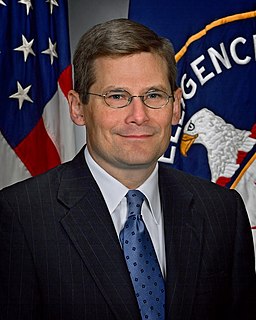A Quote by Barton Gellman
The causes and severity of NSA infractions vary widely. One in 10 incidents is attributed to a typographical error in which an analyst enters an incorrect query and retrieves data about U.S phone calls or emails.
Related Quotes
Every day, I absorb countless data bits through emails, phone calls, and articles; process the data; and transmit back new bits through more emails, phone calls, and articles. I don't really know where I fit into the great scheme of things and how my bits of data connect with the bits produced by billions of other humans and computers.
The NSA has built an infrastructure that allows it to intercept almost everything. With this capability, the vast majority of human communications are automatically ingested without targeting. If I wanted to see your emails or your wife's phone, all I have to do is use intercepts. I can get your emails, passwords, phone records, credit cards.
The program grew out of a desire to address a gap identified after 9/11 ... The program does not involve the NSA examining the phone records of ordinary Americans. Rather, it consolidates these records into a database that the government can query if it has a specific lead - phone records that the companies already retain for business purposes.
A couple of years ago, I went to dinner with a very high-profile source, and out of respect, I put my phone down for, say, an hour and a half. And during this dinner there was a major breaking story related to the Secret Service. When I picked my phone back up, I had missed about 50 emails and seven phone calls from the network.
Snowden grants that NSA employees by and large believe in their mission and trust the agency to handle the secrets it takes from ordinary people - deliberately, in the case of bulk records collection, and 'incidentally,' when the content of American phone calls and e-mails are swept into NSA systems along with foreign targets.
When I was a kid, phone calls were a premium commodity; only the very coolest kids had a phone line of their own, and long-distance phone calls were made after eleven, when the rates went down, unless you were flamboyant with your spending. Then phone calls became as cheap as dirt and as constant as rain, and I was on the phone all the time.
When we do not know the truth of a thing, it is good that there should exist a common error which determines the mind of man, as, for example, the moon, to which is attributed the change of seasons, the progress of diseases, etc. For the chief malady of man is a restless curiosity about things which he cannot understand; and it is not so bad for him to be in error as to be curious to no purpose.































